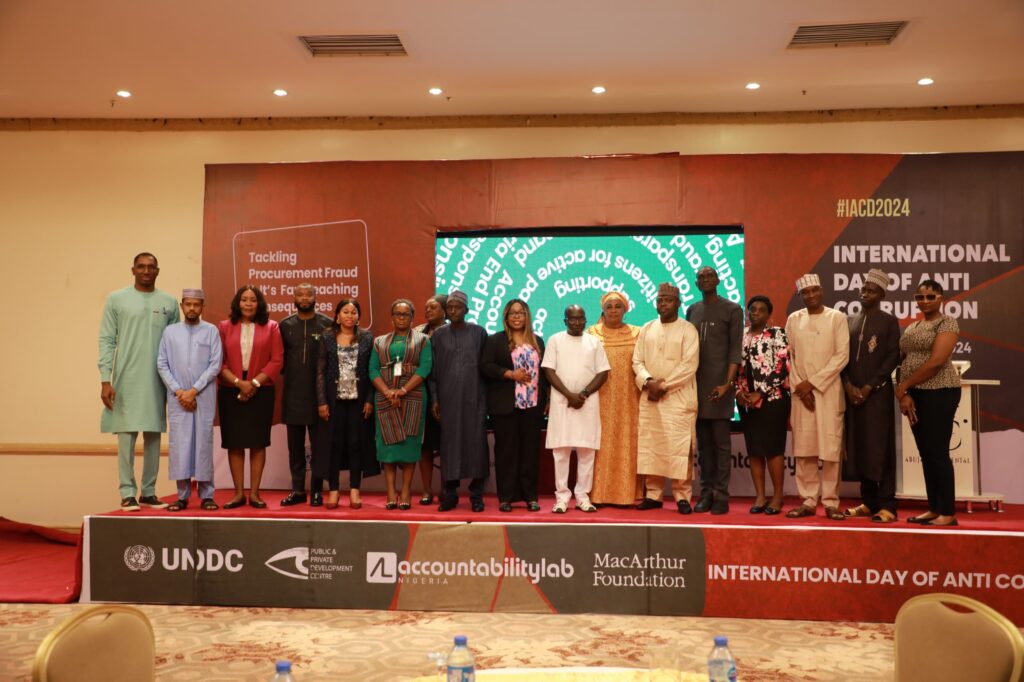
By Jacinta Nwachukwu
Some civil society organisations (CSOs) in procurement sector have stressed the need for collaborative efforts to tackle procurement fraud in a bid to drive transparency in Nigeria.
The CSOs expressed the concern at a town hall meeting in Abuja on Tuesday to commemorate the 2024 International Anti-Corruption Day.
The News Agency of Nigeria (NAN) reports that the meeting was organised by Accountability Lab Nigeria, in partnership with Public and Private Development Centre (PPDC), United Nations Office on Drugs and Crime (UNODC).
NAN also reports that the meeting was supported by John D and Catherine T MacArthur Foundation.
The event, with the theme: “Tackling Procurement Fraud and its Far-Reaching Consequences: A Collective Responsibility”, was aimed at addressing systemic challenges in Nigeria’s public procurement processes.
Chief Executive Officer of PPDC, Lucy Abagi, said that lack of accountability in public service had remained a significant challenge in Nigeria, leading to abuse of procurement processes and misuse of public resources.
Abagi alleged that currently, public procurement processes were carried out without transparency, citing unpublished procurement information.
This, she said, had left citizens in the dark about how decisions were made, thus depriving them of the chance to track the progress of projects.
According to her, accessing procurement information through Freedom of
Information (FOI) requests often proves challenging, with over 56 per cent of such requests receiving no response, reflecting a significant lack of transparency in public procurement processes.
“This persistent lack of accountability in public procurement remains a critical challenge in spite of the adoption of frameworks such as the Public Procurement Act,” she said.
Abagi also stated that inefficiencies, mismanagement and fraud persisted, notwithstanding such initiatives as the World Bank’s State Fiscal Transparency, Accountability and Sustainability (SFTAS) programme.
“These systemic issues also hinder competitive and fair business practices, limit oversight and obstruct the government’s ability to deliver public services,” she said.
Also, the UNODC Representative, Maximilian Menhard, said corruption in public procurement negatively impacted government spending and market competition as well as economic and sustainable development.
“Corruption leads to governments paying inflated prices for substandard goods and services and lack of accountability and erosion of public trust are significant outcomes of corrupt procurement practices,” Menhard said.
According to him, implementing a public procurement system based on transparency, competition and objective decision-making is essential for good governance.
Similarly, the Director-General, Bureau of Public Procurement (BPP), Dr Adebowale Adedokun, said there was the need for collective efforts to combat corruption in the procurement process.
Represented by Eugenia Ojeah, the Chief Procurement Officer, BPP, Adedokun listed the negative effects of procurement fraud to include: lack of project benefits, weakened economy and substandard products.
On her part, Amina Salihu, Deputy Director, Africa Office, MacArthur Foundation, commended the procurement officers and leaders for working to improve the system.
Salihu emphasised on the need for accountability in procurement to protect citizens’s interests.
The deputy director, therefore, called for collaboration among government, CSOs and the private sector to ensure that resources were used effectively, urging everyone to demand transparency. (NAN)